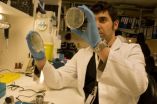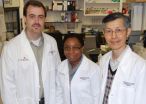(Press-News.org) Scientists from The University of Manchester – part of the Manchester Cancer Research Centre - have demonstrated the potential of a drug to improve the effectiveness of radiotherapy in stopping tumour growth.
There is increasing interest in using the body's own immune system to attack tumour cells – a strategy that can be very effective without the side effects associated with conventional chemotherapy.
Skin cancers have been successfully treated using a topical cream, imiquimod, which recruits immune cells through a molecule known as toll-like receptor 7 (TLR7), a protein that recognises foreign and potentially harmful material.
Previously, researchers in Manchester have shown that they can also stimulate the immune system into generating an immune response against non-skin cancers by injecting an agent similar to TLR7 into the blood.
In collaboration with AstraZeneca and Dainippon Sumitomo Pharma, the Manchester group have looked at another molecule that activates TLR7, known as DSR-6434. Using mouse models of two different types of cancer, they investigated DSR-6434 on its own and in combination with radiotherapy and measured the effect on the primary tumour and the number of secondary tumours in the lungs.
Professor Ian Stratford, from Manchester Pharmacy School who, with Professor Tim Illidge, led the research published in the International Journal of Cancer, said: "We have already seen a strong immune system response from other immunotherapy agents in combination with radiation – this new agent appears to be even more potent."
His team showed that administering DSR-6434 together with radiotherapy led to tumour shrinkage and increased long-term survival. They found that the combination treatment also reduced the occurrence of secondary lung tumours.
"It looks like there's good reason to use radiotherapy alongside immunotherapy agents in the treatment of solid tumours. These results strongly suggest that this sort of combination therapy should be evaluated in clinical trials with cancer patients," added Professor Stratford.
INFORMATION:
New agent may enhance effectiveness of radiotherapy
Scientists from The University of Manchester -- part of the Manchester Cancer Research Centre - have demonstrated the potential of a drug to improve the effectiveness of radiotherapy in stopping tumor growth
2014-05-13
ELSE PRESS RELEASES FROM THIS DATE:
Arthroscopy of the knee joint for arthrosis: No benefit detectable
2014-05-13
The benefit of therapeutic arthroscopy with lavage and possible debridement for the treatment of arthrosis of the knee joint (gonarthrosis) is not proven. There was no hint, indication or proof of benefit of therapeutic arthroscopy in comparison with non-active comparator interventions, e.g. sham surgery, for any patient-relevant outcome. From the active comparator therapies, only the injection of glucocorticoids into the knee joint produced worse results than arthroscopy for the outcome "global assessment of the symptoms of gonarthrosis".
This was the result of the ...
Identified 2 new genes involved in the more aggressive prostate cancer
2014-05-13
A study by the Columbia University Nova York, in collaboration with the Catalan Institute of Oncology , Belvitge Biomedical Research Institute (ICO-IDIBELL) has identified two new genes that lead to more aggressive forms of prostate cancer. The work done by Alvaro Aytes under the direction of Cory Abate-Shen , director of the Herbert Irving Comprehensive Cancer Center of the Columbia University, has been published in the latest issue of Cancer Cell.
Prostate cancer
Prostate cancer is the most common in men in Europe( accounts for 20% of all male tumors). The incidence ...
A tale of survival
2014-05-13
Frankfurt am Main, Germany, May 12, 2014. Hydrogen sulphide (H2S) is a potent inhibitor of aerobic respiration. However populations of shortfin molly fish managed to colonise springs with high concentrations of dissolved hydrogen sulphide. In a new study researchers from LOEWE Biodiversity and Climate Research Centre (BiK-F) and the Goethe University Frankfurt present evidence of genetic changes minimizing the harmful effects of H2S which enable the fish to survive in this deleterious environment. The study provides insight into the molecular mechanisms of this key adaptation ...
Bird invaders 'moving in' to UK's nature reserves
2014-05-13
A new study by scientists at the University of York and the RSPB Centre for Conservation Science has demonstrated that nature reserves and other areas specially protected for wildlife, as well as being vital for native species, are very important for helping European birds to expand their ranges into Britain naturally. The catch is that protected areas are also at increasing risk of invasion by species that have been introduced from further afield.
The research, published in the journal Diversity and Distributions, explores how the UK's special places for nature have ...
Comet theory false; doesn't explain Ice Age cold snap, Clovis changes, animal extinction
2014-05-13
Controversy over what sparked the Younger Dryas, a brief return to near glacial conditions at the end of the Ice Age, includes a theory that it was caused by a comet hitting the Earth.
As proof, proponents point to sediments containing deposits they believe could result only from a cosmic impact.
Now a new study disproves that theory, said archaeologist David Meltzer, Southern Methodist University, Dallas. Meltzer is lead author on the study and an expert in the Clovis culture, the peoples who lived in North America at the end of the Ice Age.
Meltzer's research team ...
Chemists design molecules for controlling bacterial behavior
2014-05-13
Chemists in the College of Arts and Sciences have figured out how to control multiple bacterial behaviors—potentially good news for the treatment of infectious diseases and other bacteria-associated issues, without causing drug resistance.
Yan-Yeung Luk, associate professor of chemistry, has spearheaded the discovery, in conjunction with his research lab at Syracuse University and the Wang Lab at SUNY Upstate Medical University. Their findings are the subject of a forthcoming article in the journal ChemBioChem (John Wiley & Sons Inc.).
"Since the discovery of the first ...
UCSF: E-cigarettes expose people to more than harmless vapor, should be regulated
2014-05-13
In a major scientific review of research on e-cigarettes, UC San Francisco scientists found that industry claims about the devices are unsupported by the evidence to date, including claims that e-cigarettes help smokers quit.
The review marks the first comprehensive assessment of peer-reviewed published research into the relatively new phenomenon of electronic cigarettes.
The devices, which are rapidly gaining a foothold in popular culture particularly among youth, are marketed as a healthier alternative to tobacco smoking, as an effective tool to stop smoking, ...
Scientists from USC and NYU design a molecule that blocks cancer growth in mice
2014-05-13
A team of researchers from USC and NYU has developed and patented a small molecule that interferes with cancer progression with minimal side effects.
The molecule prevents two critical proteins from interacting by mimicking the surface topography of one protein – like wearing a mask – which tricks the other protein into binding with it. This stops a so-called "transcription factor" that controls the transcription of genetic information. That transcription factor is what would have created an aberrant gene expression, contributing to the cancer growth.
Because of the ...
Scientists slow brain tumor growth in mice
2014-05-13
Much like using dimmer switches to brighten or darken rooms, biochemists have identified a protein that can be used to slow down or speed up the growth of brain tumors in mice.
Brain and other nervous system cancers are expected to claim 14,320 lives in the United States this year.
The results of the preclinical study led by Eric J. Wagner, Ph.D., and Ann-Bin Shyu, Ph.D., of The University of Texas Health Science Center at Houston (UTHealth) and Wei Li, Ph.D., of Baylor College of Medicine appear in the Advance Online Publication of the journal Nature.
"Our work ...
Birth by C-section, early antibiotic use put kids at risk for allergic esophagitis
2014-05-13
Children delivered by cesarean section and those given antibiotics during early infancy appear more prone to developing allergic inflammation of the esophagus — the muscular tube that connects the mouth to the stomach — according to results of a study by investigators from the Johns Hopkins Children's Center and Harvard Medical School.
The findings, published online May 2 in the Journal of Allergy and Clinical Immunology: In Practice, reveal that early antibiotic treatment and C-section delivery may somehow precipitate disease development by altering a child's microbiota ...
LAST 30 PRESS RELEASES:
Scientists identify smooth regional trends in fruit fly survival strategies
Antipathy toward snakes? Your parents likely talked you into that at an early age
Sylvester Cancer Tip Sheet for Feb. 2026
Online exposure to medical misinformation concentrated among older adults
Telehealth improves access to genetic services for adult survivors of childhood cancers
Outdated mortality benchmarks risk missing early signs of famine and delay recognizing mass starvation
Newly discovered bacterium converts carbon dioxide into chemicals using electricity
Flipping and reversing mini-proteins could improve disease treatment
Scientists reveal major hidden source of atmospheric nitrogen pollution in fragile lake basin
Biochar emerges as a powerful tool for soil carbon neutrality and climate mitigation
Tiny cell messengers show big promise for safer protein and gene delivery
AMS releases statement regarding the decision to rescind EPA’s 2009 Endangerment Finding
Parents’ alcohol and drug use influences their children’s consumption, research shows
Modular assembly of chiral nitrogen-bridged rings achieved by palladium-catalyzed diastereoselective and enantioselective cascade cyclization reactions
Promoting civic engagement
AMS Science Preview: Hurricane slowdown, school snow days
Deforestation in the Amazon raises the surface temperature by 3 °C during the dry season
Model more accurately maps the impact of frost on corn crops
How did humans develop sharp vision? Lab-grown retinas show likely answer
Sour grapes? Taste, experience of sour foods depends on individual consumer
At AAAS, professor Krystal Tsosie argues the future of science must be Indigenous-led
From the lab to the living room: Decoding Parkinson’s patients movements in the real world
Research advances in porous materials, as highlighted in the 2025 Nobel Prize in Chemistry
Sally C. Morton, executive vice president of ASU Knowledge Enterprise, presents a bold and practical framework for moving research from discovery to real-world impact
Biochemical parameters in patients with diabetic nephropathy versus individuals with diabetes alone, non-diabetic nephropathy, and healthy controls
Muscular strength and mortality in women ages 63 to 99
Adolescent and young adult requests for medication abortion through online telemedicine
Researchers want a better whiff of plant-based proteins
Pioneering a new generation of lithium battery cathode materials
A Pitt-Johnstown professor found syntax in the warbling duets of wild parrots
[Press-News.org] New agent may enhance effectiveness of radiotherapyScientists from The University of Manchester -- part of the Manchester Cancer Research Centre - have demonstrated the potential of a drug to improve the effectiveness of radiotherapy in stopping tumor growth


